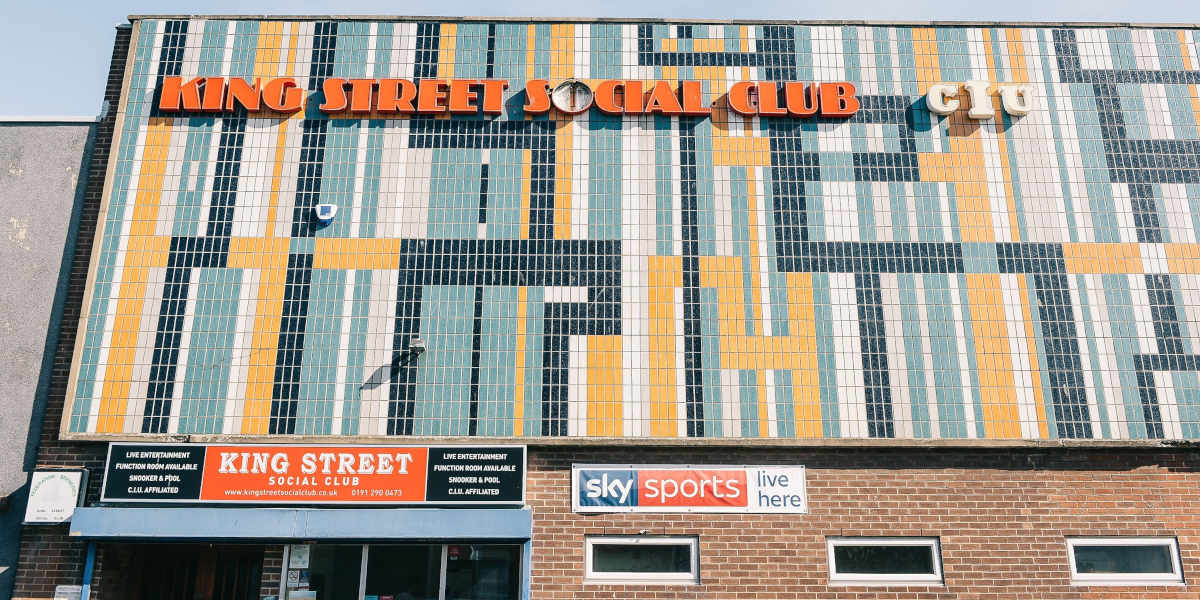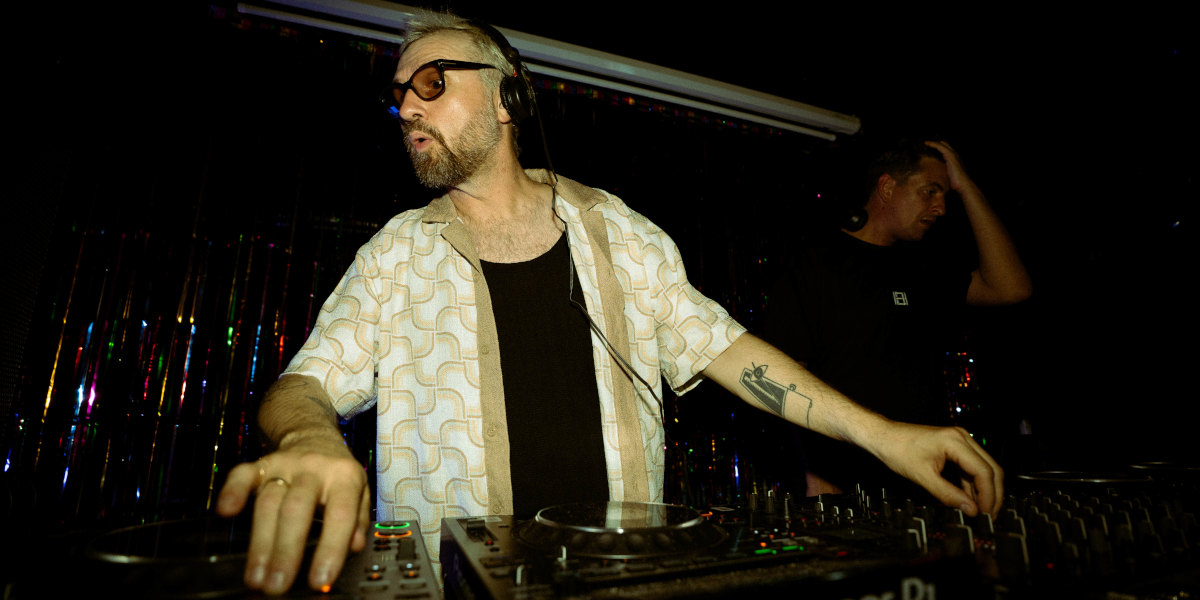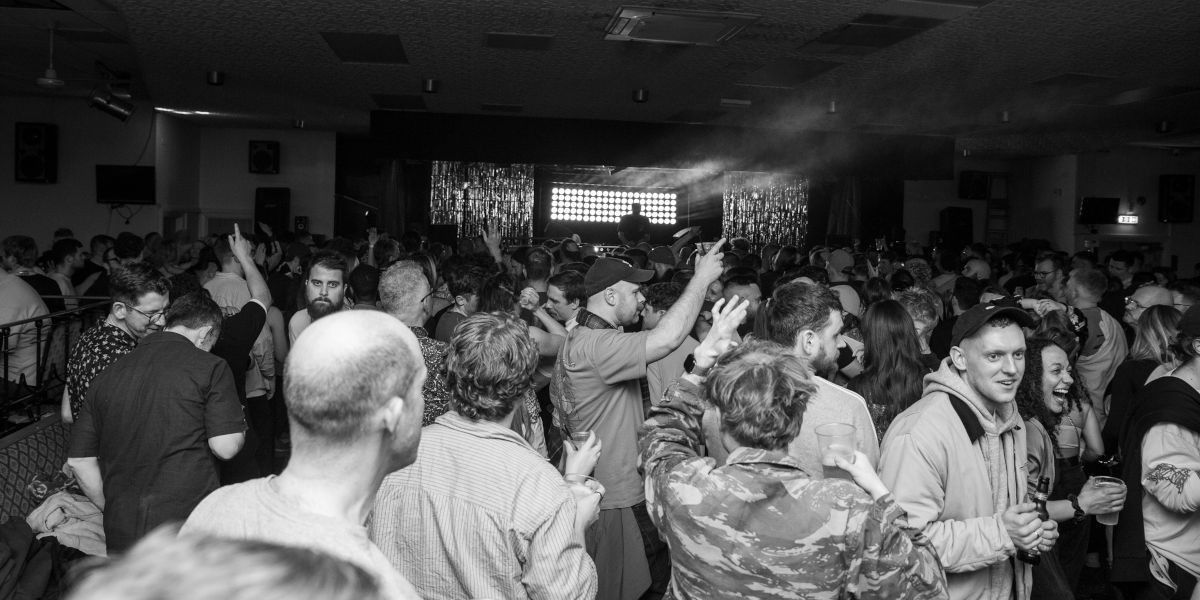We’re in the kind of room you can smell before you see it. Thick air, lager, carpet glue and cigarette smoke that’s been here since the 80s. The carpet’s patterned but worn, the wood panelling darkened by years of kicks and knocks. Glasses land with a thud on laminate tables. Laughter in one corner, the crack of pool balls in another.
This is King Street Social Club, North Shields, a spot where you can measure time in pint prices and where bingo nights, wedding discos and tribute acts have kept the lights on for decades. Some nights, it’s something else entirely. That’s because Geoff Kirkwood – better known to club-goers and the electronic music community as Man Power – is out to rewire what a social club can be.
Culture is king
King Street runs on a traditional social club licence: a member association owns the building and appoints its own management committee. It exists not to make a profit but to keep the place going. ‘It’s the only place I’ve ever been where I’ve seen a sign warning people the price of beer is about to be reduced,’ Kirkwood laughs.
Membership has however been falling since the 1970s heyday of working men’s clubs, and the management committee has in the past sold parcels of land to survive. Part of Kirkwood’s mission is to halt that dynamic, and start seeing those plots not as disposable, but as the roots of survival. ‘There’s something wonderful about a model that doesn’t prioritise profits,’ he says. ‘But you still have to make enough to survive. Plenty of mutually owned clubs have still closed.’
Kirkwood is a director of Are You Affiliated, the limited company that holds a ten-year licence to operate King Street’s lounge. In practice, that makes him both tenant and operator, sometimes promoter, sometimes venue manager. The arrangement is unusual and unconventional. Most tenants wouldn’t pour money into a building they don’t own, but doing so has given his team the security to create the conditions for King Street’s survival while keeping it rooted in the community. That hasn’t meant stripping out ceiling tiles or wood-panelled walls. It’s meant proudly retaining that character, while installing a high-end sound system.
‘There’s something wonderful about a model that doesn’t prioritise profits. But you still have to make enough to survive. Plenty of mutually owned clubs have still closed’
Under Kirkwood’s influence, the Club’s small stage has hosted DJ sets from big names including Caribou, Paul Woolford, Gerd Janson, Greg Wilson and Luka Una, not to mention a live performance by Djanjo Django. It’s a role call that proves grassroots spaces can still draw world-class talent without losing their sense of place.
Kirkwood knows the place well. ‘My great-grandad’s shop used to be here,’ he explains. ‘He allegedly gave people store credit until they all moved to the new council estate, owing him money. He ended up working in the shipyards in his sixties.’ Kirkwood laughs, not because that hardship is funny, but because of how these connections stack up over generations. ‘Once you get over the fact that this type of thing isn’t typically made by people from my background, it becomes natural that something from the likes of me should happen here too.’
The ‘thing’ in question is NXS800, an experimental orchestral work by Kirkwood and renowned composer-arranger Fiona Brice, performed by The North Shields Temporary Worldwide Orchestra – a one-off ensemble formed for the occasion. Folding orchestration, field recordings, archival voices and club culture into an event that is more living document than setlist, it’s an ambitious project for a major city concert hall, let alone an upstairs function room in a small coastal town. The choice is deliberate – and its message will reverberate.
Against the grain
Across the UK, grassroots venues are closing fast. Many don’t own their buildings, leaving operators open to rent hikes, redevelopment and eviction. According to the Nighttime Industries Association, the UK has lost one in four of its late-night venues since 2020, a record decline. Independent spaces are disappearing under pressure from rising costs, property speculation and precipitously shifting regulations. The closure of these venues doesn’t just mean fewer gigs; it signals the erosion of communal space and access to culture, community and creativity.
In that climate and by its own admission King Street Social Club tussles between survival and resistance mode, with the income generated through hosting shows and externally promoted events becoming an essential act of preservation. Doing so however also safeguards the conditions for future culture to exist – and be remade. The model gives the club a little extra to invest, while still protecting its independence.
The impact has been hard to ignore. Since taking on the space, Kirkwood and his team have pushed King Street’s bar revenue up nearly tenfold, no small feat in a town where most clubs are cutting back. That’s pulled the venue out of a constant deficit, crucially without turning the place into some unrecognisable theme-pub version of itself. The ripple effect goes beyond the four walls: the project has quietly boosted the local visitor economy, too, with Kirkwood proudly confident that folk are visiting North Shields for the first time in the droves.

King Street Social Club
CREDIT: SAM FENDER
A new beating heart
The 800-year-old fishing and factory town has seen its fleet reduced to almost nothing over the past half-century and its neighbourhoods are ranked among the ‘most deprived’ ten per cent in England. It sits alongside Whitley Bay, a former holiday town turned faded postcard, and Wallsend, where the shipyard closed in 1995. Once the bustling capital of North Tyneside, the rigours of Thatcherism (most infamously in the 1991 Meadowell riots) have left scars still visible today.
Yet out of the same NE29 postcodes, the last few years have produced an unlikely roll-call of musical success: L Devine, DJ royalty Patrick Topping and Ben Hemsley, and certified rock n’ roll megastar Sam Fender. It’s a reminder that talent keeps bubbling up even when the economy doesn’t. Post-pandemic, a new wave of creative independent activity and devolved regional funding has started to turn the tide. North Shields and Whitley Bay are recasting themselves as destinations for cultural activity and tourism, something few locals would have predicted when the Fish Quay was still the town’s beating heart.
Kirkwood has avoided being prescriptive about events at King Street. Underground electronic music has been understandably prominent under his influence, but the idea has always been to create a space where the community decides what counts as culture. ‘It’s not my place to dictate what’s cool,’ he says. ‘I don’t even really understand what that means anymore. I’m far more interested in whatever feels authentic.’
That approach has meant backing the members’ own bookings as much as his own line-ups, from cover bands, to fancy dress galas, to next year’s Americana festival, which will be headlined by the Bay City Rollers. For Kirkwood, all of it is valid entertainment; valid culture. Who wouldn’t get a thrill slotting hypnotists on the same calendar as Berlin-based techno DJs?
Creative collaboration
The balance of protecting authenticity while keeping the books in the black demands what Kirkwood calls ‘open-minded collectivism’. ‘Nostalgia is poison. It stops you from enjoying the present or learning from the past,’ he explains. ‘The model’s the starting point, but we also need more creative solutions. We’ve approached this as a partnership — finding ways to help each other. Coming together for something greater than individual gain seems the only sensible option.’
Embracing that ethos runs against what Kirkwood sees as the cultural current: the slow flattening of everything into capitalism’s one per cent monoculture. ‘I’ve watched expressions of my working-class background gradually disappear. Not through social mobility, but through capitalist homogenisation turning people into identical consumers.’ For Kirkwood, accessibility is the baseline. Tickets to NXS800 were sold at three suggested tiers, with an option to go for free, if needed, no questions asked.
‘Affordability leads to accessibility, which leads to authenticity’, Kirkwood explains. ‘Community spaces need protecting at all costs – whether they’re for working-class communities, house music communities, queer communities, ethnic communities – anything that doesn’t fit the cookie cutter of convenient consumerism.’
‘I’ve watched expressions of my working-class background gradually disappear. Not through social mobility, but through capitalist homogenisation turning people into identical consumers’
The crowd at King Street isn’t a checkbox exercise in ‘diversity’, it just pulls in a diverse crowd. Its audiences are rooted in local, Global Majority and queer culture alike, with more people from the different backgrounds than you’d usually see represented in the North East’s cultural makeup. Even the club’s long-standing membership is more varied than outsiders might be quick to assume, with Global Majority, mixed-race, and trans members woven into the fabric of the place long before Kirkwood started booking DJs.
‘We’ve seen nothing but mutual respect,’ Kirkwood says. The philosophy is simple: lead by example, do the things you believe in, and trust the room to follow. ‘We’re proud of the inclusive and varied community we’ve created,’ he says, ‘even if it doesn’t fit with other people’s prejudiced view of what that should look like.’
Restless invention
The crossover between politics and party has persisted through Kirkwood’s work and he’s always been restless with form. His early records – slow-burn, chugging house on cult underground record labels like Hivern Discs, ESP Institute and his own Me Me Me — carried a cosmopolitan sheen with Northern grit.
Darker turns came later. Bed Wetter, his politically charged ambient project, channelled Brexit-era unease into eerie atmospheres. That saw him appointed as artist in residence at Sage Gateshead’s Glasshouse International Centre for Music for 2020-2021. ‘I don’t really separate any of it,’ he says. ‘I’ve always been drawn to doing the thing I feel I’m not supposed to be doing.’
An earlier orchestral project in development with a major arts institution collapsed when Kirkwood was blocked from using his own recordings. ‘So I’m taking my ball back to start my own game in my own back yard.’ NXS800 is both local and symbolic – a way of saying working-class artists can claim space to innovate and create in forms often gatekept from them, and that doing it in their own towns can be as significant as on any big-city stage.
NXS800, which also featured a one-time-only collaboration with Teesside band BENEFITS, comes from the same instinct. Moving orchestral music into a social club isn’t a gimmick. It’s bending the form to fit a lived experience that doesn’t need the blessing of Southern institutions to count.
Man Power (Geoff Kirkwood) on the decks at King Street
CREDIT: NEIGHBOURHOOD PR

And so, on September 6, the North Shields Temporary World Wide Orchestra set up in the Kings Street Social Club function room. People drifted in from the bar, the lounge, the street, to feel strings swelling; beats pushing against the wood-panelled walls. For some, it’s the first orchestra they’ve seen play live. For others, it’s an opportunity to let their hair down on a night out, as an experimental symphony undulates around them.
‘The party is an act of co-creation,’ Kirkwood says. ‘We open the doors and turn the lights on. What you experience is a product of what you bring with you.’ The vision sounds urgent, and raises a bigger question. I ask Kirkwood what might a network of places like King Street look like if they were fully resourced and free to define their own culture?
He doesn’t have a neat answer, but is clear on one thing: ‘If we lose spaces like this, we lose the conditions for progression. Without progression, culture stagnates. And then we’re just recycling someone else’s version of life’. Kirkwood pauses, then concludes: ‘This is a show in a social club, and the reality of that is what people will take from it. What it means to them is beyond my control.’










